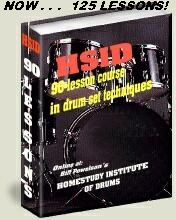16th Double-Stroke and Single Paradiddle Rolls
These two rolls resemble the single stroke roll in appearance and sound. When played on the snare drum, they will each sound exactly like the 16th Single Stroke Roll of the previous lesson. Don't let that fool you! Notice the stroke pattern ( 'R'=Right and 'L'=Left.) Their rhythmic diversity will become much more apparent as you move them around the set. They are 'Rudiments' and therefore necessary in the development of your total coordination. Memorize the stroke pattern of each roll, then play each as a steady stream of notes, as we did in the single stroke lesson. Then try them as fill patterns, (practice moving to the hi-hat on the final note.) Be able to play both roll patterns with the 8th 'rock' beat and try them out as you play along with your favorite records, tapes and CDs.
THE FINAL STEP:
Playing with music, is the most important part. If you can adapt these patterns to music and learn to use them habitually, they will reach perfection in a short time. You should be having fun as they develop . . . just playing the music you love.
16th Note, Double-Stroke Roll
Memorize . . .

Move to the Hi-Hat . . .

Attach it to the 8th 'rock' dancebeat . . . 
![]() VIDEO: Click here to 'Play', see, and hear the DOUBLE STROKE FILL WITH THE 8TH ROCK BEAT.
VIDEO: Click here to 'Play', see, and hear the DOUBLE STROKE FILL WITH THE 8TH ROCK BEAT.
16th Note Paradiddle Roll
Memorize . . .

Move to the Hi-Hat . . .

Attach it to the 8th 'rock' dancebeat . . .

![]() VIDEO: Click here to 'Play', see, and hear the 16TH PARADIDDLE FILL, WITH THE 8TH ROCK BEAT.
VIDEO: Click here to 'Play', see, and hear the 16TH PARADIDDLE FILL, WITH THE 8TH ROCK BEAT.
Be able to adapt either roll to an eighth 'rock' dance beat in progress, then any of your favorite eighth 'rock' songs. Later, you will discover 'naturally' that all these fills will work well with nearly ANY beat or beat variation.

The 16th double-stroke and 16th single-paradiddle rolls will sound exactly like the 16th single-stroke roll when played on the snare as they are written here. Keep in mind though, as you begin to move these rolls around the drumset, they will take on different sounds of their own.
FOR EXAMPLE:
Place your right stick on one of the tom toms and your left stick on the snare. Now play paradiddles, doubles or singles. Notice that each roll will produce a much different sound when played this way. Let your imagination run wild! Experiment with these rolls every conceivable way, around the kit. The videos are designed to illustrate the point. You may play these fills to any drum, for any length, at almost any time. Simply stay in-sync with the music. They sky is the limit.
OTHER IMPORTANT POINTS:
The fills you are learning here will easily adapt to ANY OF THE BASIC DANCEBEATS. They work almost exactly the same . . . begin your fill on a bass drum note and get back to the hi-hat on a bass note. If you keep the bass continuous, you'll never lose the beat. Try doubling or tripling these fills. Try them with 16th 4/4, Shuffle and 4th 4/4. They are nearly the same, although with 16th 4/4, you'll only have one bass for 16 fill notes, and in 4th rock 4/4 you'll have a bass at the beginning of every four fill notes.
Yes! The note value names of these fills will change when we use them with the other basic dancebeats, but don't worry about all that now. Just try DOING these rolls with all but the Blues beat. In another lesson we'll learn the special tricks that will allow us to use them with the Blues beat too.
These fills will work with Shuffle in EXACTLY the same way as they are here.
NEXT: 8th Triplets . . . will add soul to your solos!
Speaking of soul, how's yours?
I'll offer you mine if you'll click here!
Finite To Infinity
3 very important questions
IS IT POSSIBLE THAT YOUR 'NATURAL GIFT' OF RHYTHM CAN BE DOUBLED WITH ONLY A LITTLE ADDITIONAL (PREVIOUSLY UNAVAILABLE), KNOWLEDGE?
IS THERE A 'KNOWLEDGE GAP' IN YOUR OWN UNDERSTANDING OF 'RHYTHM'?
IS IT POSSIBLE TO GAIN A COMPLETE AND THOROUGH UNDERSTANDING OF 'ALL RHYTHM', WITHIN ONLY A COUPLE HOURS OF EASY, AND FASCINATING, STUDY ?
Answers: YES! YES! YES!
Get All Products Here

GET ALL THE PRODUCTS AT ONE LOW PRICE.
SURPRISES ABOUND!!!! . . . For those with a bit of generosity in their soul.
CLICK HERE , to see what I mean.
Intermediate & Advanced Drummers
- Drum Instructors Wanted
- Teach My Lessons and Methods
- Up to $60.00/hour
Pre-School Drummer?
Can we teach rhythm to pre-schoolers? YES!
This is a very short course, designed to help adults plant the seeds of rhythm into children of nearly any age. Click Here!!
Make CASH $$$ Now!!!

FREE ELECTRONIC BOOK BONUS (also included) BUSINESS OPPORTUNITY:
- * MAKE BIG MONEY SELLING USED DRUMSETS!
- * INSIDER HARDBALL-BUYING-TIPS AND SECRETS.
- * UNIQUE RECOVERING SECRETS
Support Us Today!!
Support this site and and gain an advetising bargain with the deal. Place a permanent ad here.
